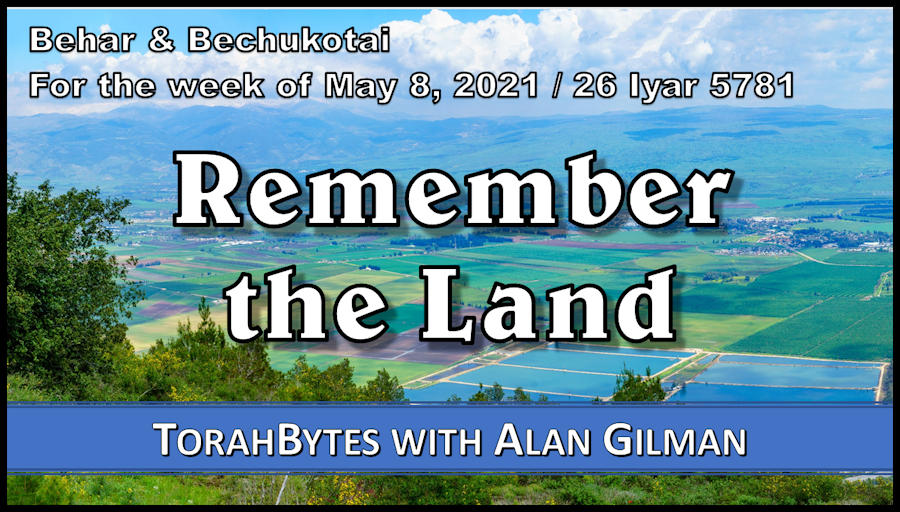For the week of May 8, 2021 / 26 Iyar 5781
Behar & Bechukotai
Torah: Vayikra/Leviticus 25:1 – 27:34
Haftarah: Jeremiah 16:19-17:14
Download Audio [Right click link to download]
But if they confess their iniquity and the iniquity of their fathers in their treachery that they committed against me, and also in walking contrary to me, so that I walked contrary to them and brought them into the land of their enemies—if then their uncircumcised heart is humbled and they make amends for their iniquity, then I will remember my covenant with Jacob, and I will remember my covenant with Isaac and my covenant with Abraham, and I will remember the land. (Vayikra/Leviticus 26:40-42)
This week’s parsha includes one of the Torah sections outlining the results of either living according to God’s directives or not (Vayikra/Leviticus 26:14-43). Included here is God’s promise of restoration—if and when Israel repents after a time of spurning him. The restoration of wayward Israel is a core theme in the Books of the Prophets. While according to this and other similar sections of Torah, restoration is contingent upon repentance, the prophets envision a guaranteed restoration (e.g. Jeremiah 31:31-34; Ezekiel 37:11-14), something that the New Covenant Writings affirm (see Romans 11:16-27). Based on a holistic view of Scripture we can be certain that the promised restoration will be precipitated by the necessary repentance.
The anticipation of restoration is deeply rooted in God’s covenant with Abraham, Isaac, and Jacob. But notice that they are, perhaps for the only time, listed in reverse order: “then I will remember my covenant with Jacob, and I will remember my covenant with Isaac and my covenant with Abraham.” This emphasizes the depths of God’s commitment to Israel. The reverse order underscores that the commitment of God to Abraham was an inheritance. Something real and eternal was established with and to Abraham and confirmed within his family line specifically through Isaac and then Jacob. The future behavior of their descendants can in no way undermine the everlasting nature of God’s promise to the nation. How each individual may or may not benefit from their inheritance is one thing, which in no way effects the promise itself.
This passage tells us that there is more going on than a commitment to a people. God also said through Moses that he would “remember the land.” The anticipated repentance of Israel doesn’t only evoke God’s covenantal commitment to Abraham, Isaac, and Jacob, but realigns the people of Israel with God’s purposes for the land of Israel.
God’s promise to Abraham included the land. As he continued to wait upon God for further developments, which included the creation of a nation derived from him and Sarah despite their old age, the land continued to be part and parcel of the overall promise. The unconditional nature of God’s covenant with him always included the land (see Bereshit/Genesis 15:17-21).
The tendency of many Bible adherents to emphasize the so-called spiritual aspects of scripture over and against the earthly ones undermines the effectiveness of scripture in instructing us for living life. The Bible’s understanding of the world is a wonderfully integrated mix of the seen and unseen elements of life. The creation is the realm in which we were meant to live. Israel is chosen by God to reflect the importance of living life according to the purposes and ways of God.
Human beings spend too much time attempting to resolve environmental and political problems through technology and the manipulation of behavior. We think we can fix our problems directly by confronting them with our own ingenuity. The story of Israel in the Bible us reminds, however, that the key to creation restoration is by way of humble submission to the Creator.
Scriptures taken from the English Standard Version
